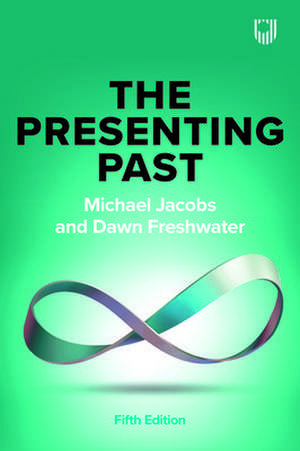The Presenting Past
Autor Michael Jacobs, Dawn Freshwateren Limba Engleză Paperback – 10 mai 2023
Julia McLeod, Lecturer in Counselling, Abertay University, UK
“Every edition of a long established text begs the question – what’s new? Michael and Dawn continue to honour the wisdom and relevance of prior editions with characteristic humour and humility. This touchstone text conveys with clarity the richness of Psychodynamic approaches.”
Paul King, Assistant Professor, Guidance Counselling and Education, School of Human Development, Dublin City University, Ireland
“A highly respected ‘classic’ text which has been thoroughly revised and extended to reflect the changed and changing landscape of therapeutic practice.”
Keith E Walmsley-Smith, visiting Lecturer in Clinical Psychology, Staffordshire University, UK
A person's past is ever present, from infancy to old age, and it affects the dynamics of therapy and the therapist-patient relationship.
Written by a key founding figure of psychodynamic counselling and now with contributions from pre-eminent researcher, Dawn Freshwater, the bestselling The Presenting Past gives practicing therapists and students keen insight into the subject. The theories of Freud, Winnicott, Klein are now complimented by attachment theory and self-psychology and are organized into three main categories: trust and attachment; authority and autonomy; and concord and challenge.
In this new edition, Jacobs and Freshwater give psychodynamic counselling and therapy a truly human face. The connections between theory and practice are highlighted through the use of compelling case examples and end of chapter exercises. Combined with an approachable writing style, this edition is the go-to for busy professionals and trainees.
Fully updated to include coverage of the prevalence of social media; debates about gender identity and sexuality; the significance of attachment theory and attachment-based practice and self-psychology and its concentration upon the problems of narcissistic wound, The Presenting Past stays wonderfully readable.
The book shows Jacobs at his best and is a testimony to his lifetime of experience. Michael Jacobs and Dawn Freshwater provide a clear modernisation on this classic, best-selling text.
Michael Jacobs is one of the pioneers of psychodynamic counselling in Britain. He developed the counselling and psychotherapy programme at the University of Leicester, UK up to his retirement in 2000.
Dawn Freshwater is adjunct Professor of Mental Health at the University of Leeds, UK and the University of Western Australia, Australia.
Preț: 229.48 lei
Nou
Puncte Express: 344
Preț estimativ în valută:
43.91€ • 45.85$ • 36.26£
43.91€ • 45.85$ • 36.26£
Carte disponibilă
Livrare economică 25 martie-08 aprilie
Livrare express 08-14 martie pentru 22.56 lei
Preluare comenzi: 021 569.72.76
Specificații
ISBN-13: 9780335251841
ISBN-10: 0335251846
Pagini: 288
Dimensiuni: 152 x 229 x 14 mm
Greutate: 0.33 kg
Ediția:5
Editura: McGraw Hill Education
Colecția Open University Press
Locul publicării:United Kingdom
ISBN-10: 0335251846
Pagini: 288
Dimensiuni: 152 x 229 x 14 mm
Greutate: 0.33 kg
Ediția:5
Editura: McGraw Hill Education
Colecția Open University Press
Locul publicării:United Kingdom
Cuprins
Preface
1 Here and Now – There and Then
PART 1: TRUST AND ATTACHMENT
Introducing Trust and Attachment Issues
2 Trust and Attachment: Foundations
3 Trust and Attachment: Relatedness and Separateness
4 Trust and Attachment: In Adulthood and In Therapy
Concluding Trust and Attachment Issues
PART 2: AUTHORITY AND AUTONOMY
Introducing Authority and Autonomy Issues
5 Authority and Autonomy: Internalisation
6 Authority and Autonomy: Defending The Self
7 Authority and Autonomy: The Therapeutic Relationship
Concluding Authority And Autonomy Issues
PART 3: CONCORD AND CHALLENGE
Introducing Concord and Challenge Issues
8 Concord and Challenge: Gender, Sexuality and Sexual Relations
9 Concord and Challenge: Making Relationships
10 Concord and Challenge: Complementarity and Rivalry
Concluding Concord and Challenge Issues
Afterword
References
Index
1 Here and Now – There and Then
PART 1: TRUST AND ATTACHMENT
Introducing Trust and Attachment Issues
2 Trust and Attachment: Foundations
3 Trust and Attachment: Relatedness and Separateness
4 Trust and Attachment: In Adulthood and In Therapy
Concluding Trust and Attachment Issues
PART 2: AUTHORITY AND AUTONOMY
Introducing Authority and Autonomy Issues
5 Authority and Autonomy: Internalisation
6 Authority and Autonomy: Defending The Self
7 Authority and Autonomy: The Therapeutic Relationship
Concluding Authority And Autonomy Issues
PART 3: CONCORD AND CHALLENGE
Introducing Concord and Challenge Issues
8 Concord and Challenge: Gender, Sexuality and Sexual Relations
9 Concord and Challenge: Making Relationships
10 Concord and Challenge: Complementarity and Rivalry
Concluding Concord and Challenge Issues
Afterword
References
Index
